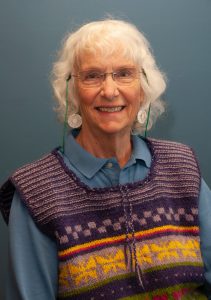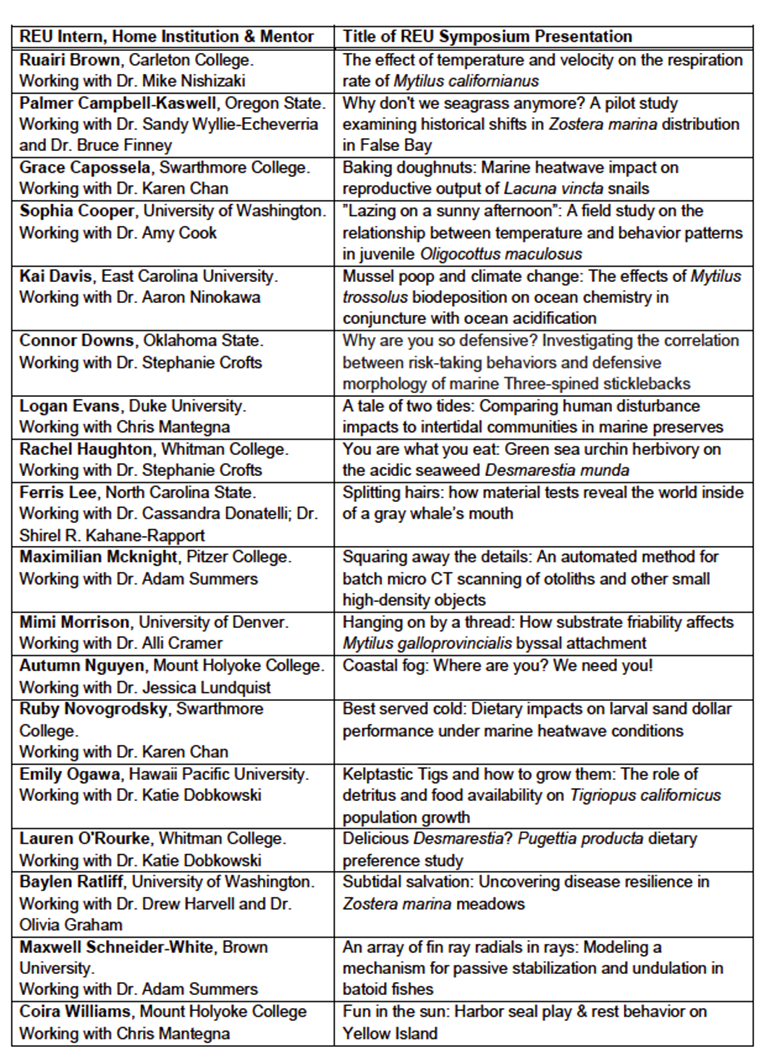 This month we have a nice description of FHL’s REU program, of which we are very proud! We love the way this mentored-research program blends our missions of research and education, and also links undergraduate education with preparing students for graduate school. It’s impossible to really describe the positive energy this program generates among the students and their mentors, and which spreads to the entire FHL campus each summer, but Amy tries here. She doesn’t dwell on the time that she took, as REU Coordinator this year, in reading every one of the applications received (see the unbelievable number below). That’s devotion to the program!
This month we have a nice description of FHL’s REU program, of which we are very proud! We love the way this mentored-research program blends our missions of research and education, and also links undergraduate education with preparing students for graduate school. It’s impossible to really describe the positive energy this program generates among the students and their mentors, and which spreads to the entire FHL campus each summer, but Amy tries here. She doesn’t dwell on the time that she took, as REU Coordinator this year, in reading every one of the applications received (see the unbelievable number below). That’s devotion to the program!
Becoming a Scientist: The REU Program at FHL
by Dr. Amy Cook
It started with 470 applications
The Friday Harbor Labs’ Research Experience for Undergraduates (REU) program has consistently attracted a large pool of applicants, but the application stack for the summer of 2023 was the largest yet at 470 applicants. The REU program at FHL is NSF-funded and aims to give undergraduate students an opportunity to participate in research with scientists at the Labs and gain professional development skills as well. The REU Interns are at FHL for eight weeks. They live in the dorms and eat in the dining hall, which gives them the opportunity to interact with students taking summer classes.

-Autumn Nguyen, REU Intern from Mount Holyoke College
The candidate pool for 2023 was not only large, but highly qualified as well. When I sent short lists of applicants to REU Mentors to choose from, a comment I heard again and again was “They are all so good, it’s hard to choose!” From that pool of applicants we got a great cohort of 18 REU students. Mentors and interns came from all over the United States and the research they did over the summer covered a broad range of research topics, with REUs working in marine botany, invertebrate physiology, vertebrate functional morphology, atmospheric science and invertebrate and vertebrate behavior, both in the lab and in the field.
One of our goals for the REU program is to not only get the students doing real research but to broadly prepare them for life as scientists – both within academia and as researchers in other contexts like State and Federal agencies or non-profits. In a series of Lunches with Researchers and Tuesday afternoon workshops, the REU students learned about the various paths that people take to becoming a research scientist, how to apply for and be successful in graduate school, how to apply for grants and fellowships, and how to create effective scientific presentations. They also developed skills in navigating scientific literature and working with data and programming.
One of the interests of this cohort of students was learning to communicate their science with people outside of academia. Though we were not able to go into this in a lot of detail due to time constraints, we provided the students with some readings as examples of science communication for a non-science audience and, in one of the Lunches with Researchers, Dr. Drew Harvell provided them with some ideas and examples of this.
“The REU program is diverse in so many ways. The students working with me were involved in automated 3D image analysis and structures associated with flapping locomotion. The students showed an impressive willingness to look at science very broadly to appreciate their colleagues’ projects despite no overlap in techniques or motivation. “
-Dr. Adam Summers, University of Washington

Fun time!
So, you’re in the San Juans: you gotta see whales, right? One of the big desires in the group was to see orcas, so we arranged a whale watching trip in week 4 of the program. The REUs got their wish in spades! We saw a group of Biggs (Transient) orcas off of Vancouver, B.C. that included females, a few big males and at least two youngsters. We hung out for about an hour and the whales put on quite a show with frequent tail slaps and many breaches by both the adults and the juveniles. Other wildlife the students saw included a group of harbor seals hauled out on a small rocky island and two Bald eagles.
REU Symposium
The REU students gave an excellent series of talks at a symposium at the end of their 8 weeks. This group demonstrated strong public speaking skills and many of their presentations showed that the members of this cohort have great potential as science communicators across a wide variety of audiences. Just looking at the titles (Table 1) shows the great sense of whimsy and fun that was present in this cohort.

One of the biggest take-aways from this experience for the REU students was the opportunity to be embedded in the supportive and enthusiastic community of researchers at the Friday Harbor Labs. The interns experienced this in the research labs that they worked with, but also in the larger community. At the start of Summer sessions A and B there were sets of “lightning talks” given by a variety of people working at FHL, with the aim of helping everyone get to know each other and learn more about the questions people were working on. Many folks ended their lightning talks with the invitation “If you are curious about what we’re doing, come on by lab…” This really made an impression on the REU students with regards to the welcoming nature of FHL.
“The REU program at FHL was an amazing experience, professionally and socially. I was able to further develop my skills in reading research papers, creating and conducting research experiments, being more independent, and I was able to find people that were also just as interested in marine biology as I was. It is a great community and if I had the chance, I would do it all over again in a heartbeat.”
-Conner Downs, REU Intern from Oklahoma State
It doesn’t end here. Many of the REUs will be giving talks at SICB’s (Society for Integrative and Comparative Biology) annual meeting in early January in Seattle, Washington. Based on past experience, I expect we will see some of these people return to FHL as PhD students, postdocs or full-fledged research scientists bringing their own students to experience the welcoming research community at the Labs.
The REU Program is supported by a grant from the National Science Foundation (DBI-2149705). FHL supplements this with funds donated to the Anne Hof Blinks Fellowship in Marine Biology. Both funding sources seek to increase diversity of underrepresented minorities in marine science, and the FHL REU program has been very successful at this goal!


Give to FHL by choosing a fund here. The Blinks Fellowship supports our REUs.